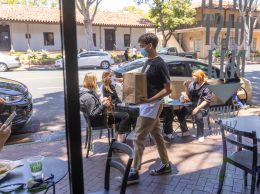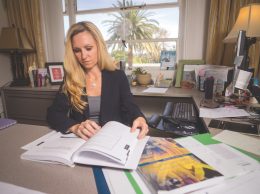In this time of mass uncertainty due to the COVID-19 pandemic, two South Coast organizations are stepping up to provide aid in the form of humanitarian relief and shelters — LifeCube, based in Santa Barbara, and Summerland’s branch of ShelterBox USA.
LifeCube, founded in 2009 by CEO Mike Conner, makes a product called LifeCube 12 that is a 12 by 12 foot inflatable shelter device that comes stocked with an independent power box, fans, lights, and air conditioning. The unit comes with food, first aid, water, and other emergency provisions.
“If you get a cube, you’re going to make it,” said Conner. “Typically, the whole concept in the beginning was five people for five days.”
While the LC-12 units have already been used in disaster situations and donated to agencies like the American Red Cross, Conner is in the process of developing a new product, the Hard Cube, specifically to combat pandemics such as COVID-19.
This new cube will feature amenities such as a shower for hazmat washdowns, come with 15 gallons of water on board, provide radiant heat, and be able to produce 600 watts of energy, “enough to power most small houses.”
“This product is mostly driven by coronavirus. It is a corona unit,” Conner said. “This unit gives people a place to store their equipment, categorize their test results, stay out of the sun and weather, and change clothes.”
Due to the rigid walls of the structure, it is easily sanitized and completely airtight.
“It can easily be an isolation unit,” Conner said.
LifeCube has already donated some of their devices to be used as testing sites amidst the global pandemic.
While the Hard Cube is projected to be completed by the end of June, LifeCube has turned its focus to prepositioning and being readily prepared for when the next disaster hits.
“In Europe, it’s different than here. They talk about prepositioning and having strategic warehouses all over Europe so when something happens, they can respond right away. Here, we’re more into reacting,” said Stephen Bonser, communications manager for LifeCube.
“We had to learn this lesson the hard way, and that’s happening right now,” said Conner.
The LC-12 retails anywhere from $15,000-$22,000, depending on how much power is wanted within the unit. The new Hard Cube is more affordable and projected to cost around $12,000.
“Local people are fighting back and trying to come up with new solutions, and that’s exactly what we’re doing,” Conner said.
ShelterBox USA in Summerland is another local organization rising to meet the challenges that COVID-19 is creating everywhere.
ShelterBox USA tailors aid for various disasters and communities affected, because it said one disaster does not fit all. It provides refugee populations with masks, gloves and sanitizer to help prevent the spread of COVID-19.
ShelterBox also provides supplies such as cooking sets, solar lights, and activities for children.
One specific project that Kerri Murray, president of ShelterBox USA, created due to the pandemic is the ShelterBox USA Cooking through Corona Facebook page.
The Facebook page is intended to bring people together by providing recipes from all across the globe. Most recipes include items that people have been stocking their pantry with since the virus erupted, such as beans and rice.
“There is something about restoring a sense of normality and security from cooking and eating a hot meal together as a family,” said Murray. “Something about cooking a meal just cuts through the chaos.”
Members who like the page can send in their own recipes so that cultures can disperse globally in the form of different foods made. It starts with sharing a recipe, and then people all across the world have begun to make their own variations of the dish.
People have already sent in recipes from countries such as Kenya, Italy and Australia.
“It was created as a mechanism to connect our staff and our global-base of volunteers,” said Murray. “I wanted a way to stay connected when our work was changing vastly.”
This is something that ShelterBox USA hopes to continue even after the virus has subsided.
“I think a lot of people are wondering what’s going to happen after,” said Murray. “But it’s kind of neat to see how people are connecting. This is something that brings comfort in a time of panic.”
• Contact Jade Martinez-Pogue at intern@pacbiztimes.com.






 Print
Print Email
Email

















